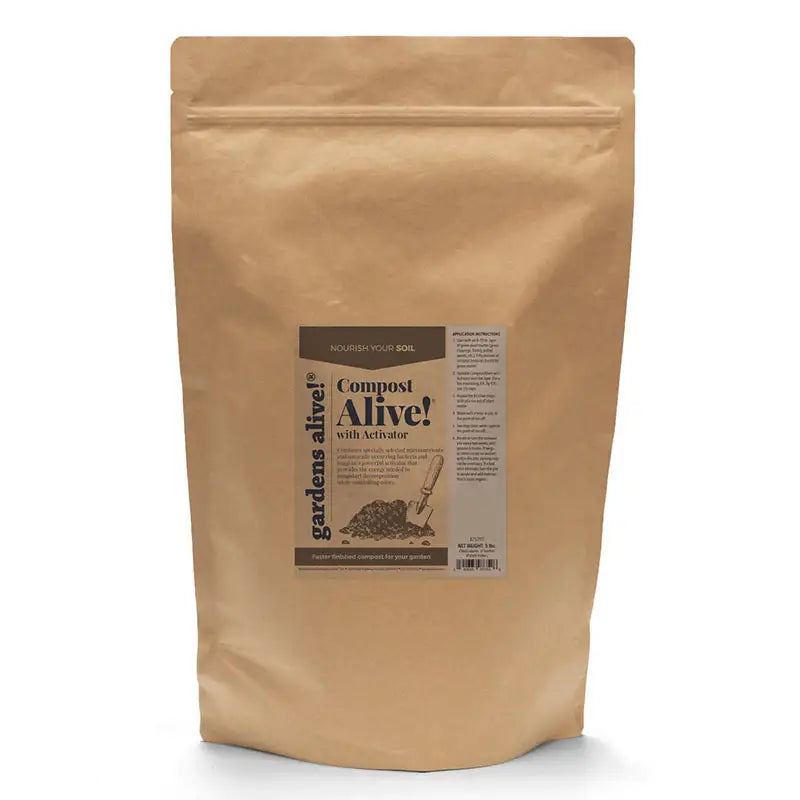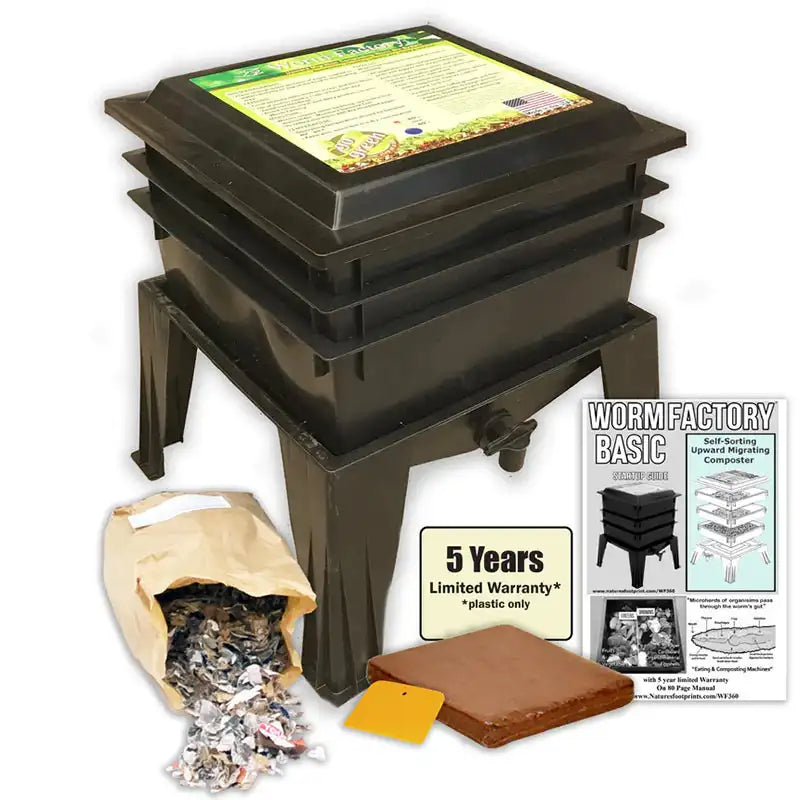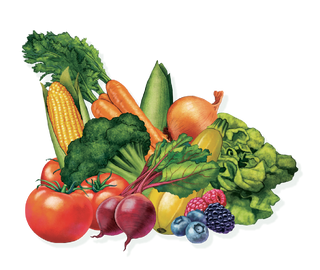Can You Grow 'Conventional' Plants Organically?
Q. Ashley in Washington NJ writes "I'd really appreciate your insight into this topic. I reached out to a big supplier of fruit trees and berry bushes. I asked if they use herbicides and pesticides on their plants, including Round-up.
They told me they try to use "natural" products but don't disclose what they use and do not know what *their* suppliers use! They said that if I grow the plants organically, then all previous herbicides/pesticides should be gone from the plant by the time it bears fruit!
That doesn't sit well with me. Can you please share your insights into growing conventional plants organically and what risks, if any, are involved?"
A. I have always maintained that how YOU grow the plants is what's important. Yes, you should absolutely purchase organic plants and seeds as often as possible. Not only are the plants certain to be free of toxins, but you are financially supporting the growers, who have pledged to protect our air, water and land by practicing good stewardship in their growing.
But sometimes we can't find what we want or are running out of time to plant and purchase 'conventionally 'grown seeds and young plants. That's OK if you grow them organically after that; you're still achieving 100 percent of your goal--protecting your health and that of the planet.
About bunny poop
Tina in Altoona writes: I recently got a pet bunny. She produces a shocking amount of waste! I read somewhere that it can be used as fertilizer. Can you tell me more? The how's and why nots? Should I just toss it in the leaf/grass compost pile we started and mix regularly?
I lived in a home with no yard for 17 years and recently moved to a new home with a nice yard! So, I know nearly nothing about this sort of thing! Thank you so much!
A. Bunny poop makes a fine fertilizer, as does the pelletized poop of llama, gerbil, and other herbivores. You can either add it to your compost pile; or use it straight in the garden.
Like granulated fertilizers in general, you should remove any kind of mulch, 'scratch' the pellets gently into the top inch of the soil and then cover them with good garden soil, high quality topsoil or compost. As opposed to liquid fertilizers like compost tea or excess liquid from a worm bin, 'solid' fertilizers like this have to be covered with good soil or compost to become activated.
As with any full strength fertilizer, don't use it on baby plants. Let them grow for a couple of weeks first.
Oh--and read and/or listen to the next question for my obligatory grass clipping warnings.
Dude; Where's my compost?
Q. Eric in Montreal writes: 'I watched your TED talk, "Everything You Know About Composting is Wrong" and bought into your religion wholesale, but I'm having a crisis of faith as it's not turning out as foretold in your prophecy.
I started my pile with backyard fallen leaves in autumn, using your suggested method of sucking them up with a leaf blower in reverse which also shredded them. Some other non-shredded leaves fell on top afterwards but the bulk of it is leaves shredded with the leaf blower.
Just recently, I dug into the pile with a shovel and it appeared as if nothing had really changed. The top few inches are very wet from rain/snow, but the leaves at the bottom look practically unchanged. I've attached a couple pictures. One is what the pile looks like now and the other is a close-up of the hole I dug in it. What am I doing wrong?
A. I don't think you're doing anything wrong. The first part of my TED talk was aimed at people who aren't composting because they're confused about "putting the wrong things in", and I wanted to assure them that shredded leaves alone will become compost just fine, but it may take awhile.
As I proceeded, I explained that you could greatly speed up the composting process by mixing those shredded leaves with a rich source of nitrogen, specifically spent coffee grounds. I warned people not to use grass clippings unless they are CERTAIN the clippings came from an untreated lawn...
(...you wouldn't believe how many people swear that their lawn isn't treated, and then I ask them if they use 'weed and feed' and they say "yes".)
Clippings from an untreated lawn are a fine source of nitrogen but removing them starves the lawn of its favorite food. Besides, used grounds are readily available from any diner or coffee shop, and using THEM also keeps a valuable source of plant nutrition out of the waste stream.
In my experience a pile like yours, which is in a big rectangular wire cage, should have some compost on the bottom by now, and moving the pile over to another spot to get at that compost will mix up the remainder and help it cook down faster.
Turning the pile over several times in the winter will also move things along faster, as will double or triple shredding leaves as you collect them. but even if you do none of that, your shredded leaves should become compost sometime over the summer.
They told me they try to use "natural" products but don't disclose what they use and do not know what *their* suppliers use! They said that if I grow the plants organically, then all previous herbicides/pesticides should be gone from the plant by the time it bears fruit!
That doesn't sit well with me. Can you please share your insights into growing conventional plants organically and what risks, if any, are involved?"
A. I have always maintained that how YOU grow the plants is what's important. Yes, you should absolutely purchase organic plants and seeds as often as possible. Not only are the plants certain to be free of toxins, but you are financially supporting the growers, who have pledged to protect our air, water and land by practicing good stewardship in their growing.
But sometimes we can't find what we want or are running out of time to plant and purchase 'conventionally 'grown seeds and young plants. That's OK if you grow them organically after that; you're still achieving 100 percent of your goal--protecting your health and that of the planet.
About bunny poop
Tina in Altoona writes: I recently got a pet bunny. She produces a shocking amount of waste! I read somewhere that it can be used as fertilizer. Can you tell me more? The how's and why nots? Should I just toss it in the leaf/grass compost pile we started and mix regularly?
I lived in a home with no yard for 17 years and recently moved to a new home with a nice yard! So, I know nearly nothing about this sort of thing! Thank you so much!
A. Bunny poop makes a fine fertilizer, as does the pelletized poop of llama, gerbil, and other herbivores. You can either add it to your compost pile; or use it straight in the garden.
Like granulated fertilizers in general, you should remove any kind of mulch, 'scratch' the pellets gently into the top inch of the soil and then cover them with good garden soil, high quality topsoil or compost. As opposed to liquid fertilizers like compost tea or excess liquid from a worm bin, 'solid' fertilizers like this have to be covered with good soil or compost to become activated.
As with any full strength fertilizer, don't use it on baby plants. Let them grow for a couple of weeks first.
Oh--and read and/or listen to the next question for my obligatory grass clipping warnings.
Dude; Where's my compost?
Q. Eric in Montreal writes: 'I watched your TED talk, "Everything You Know About Composting is Wrong" and bought into your religion wholesale, but I'm having a crisis of faith as it's not turning out as foretold in your prophecy.
I started my pile with backyard fallen leaves in autumn, using your suggested method of sucking them up with a leaf blower in reverse which also shredded them. Some other non-shredded leaves fell on top afterwards but the bulk of it is leaves shredded with the leaf blower.
Just recently, I dug into the pile with a shovel and it appeared as if nothing had really changed. The top few inches are very wet from rain/snow, but the leaves at the bottom look practically unchanged. I've attached a couple pictures. One is what the pile looks like now and the other is a close-up of the hole I dug in it. What am I doing wrong?
A. I don't think you're doing anything wrong. The first part of my TED talk was aimed at people who aren't composting because they're confused about "putting the wrong things in", and I wanted to assure them that shredded leaves alone will become compost just fine, but it may take awhile.
As I proceeded, I explained that you could greatly speed up the composting process by mixing those shredded leaves with a rich source of nitrogen, specifically spent coffee grounds. I warned people not to use grass clippings unless they are CERTAIN the clippings came from an untreated lawn...
(...you wouldn't believe how many people swear that their lawn isn't treated, and then I ask them if they use 'weed and feed' and they say "yes".)
Clippings from an untreated lawn are a fine source of nitrogen but removing them starves the lawn of its favorite food. Besides, used grounds are readily available from any diner or coffee shop, and using THEM also keeps a valuable source of plant nutrition out of the waste stream.
In my experience a pile like yours, which is in a big rectangular wire cage, should have some compost on the bottom by now, and moving the pile over to another spot to get at that compost will mix up the remainder and help it cook down faster.
Turning the pile over several times in the winter will also move things along faster, as will double or triple shredding leaves as you collect them. but even if you do none of that, your shredded leaves should become compost sometime over the summer.



